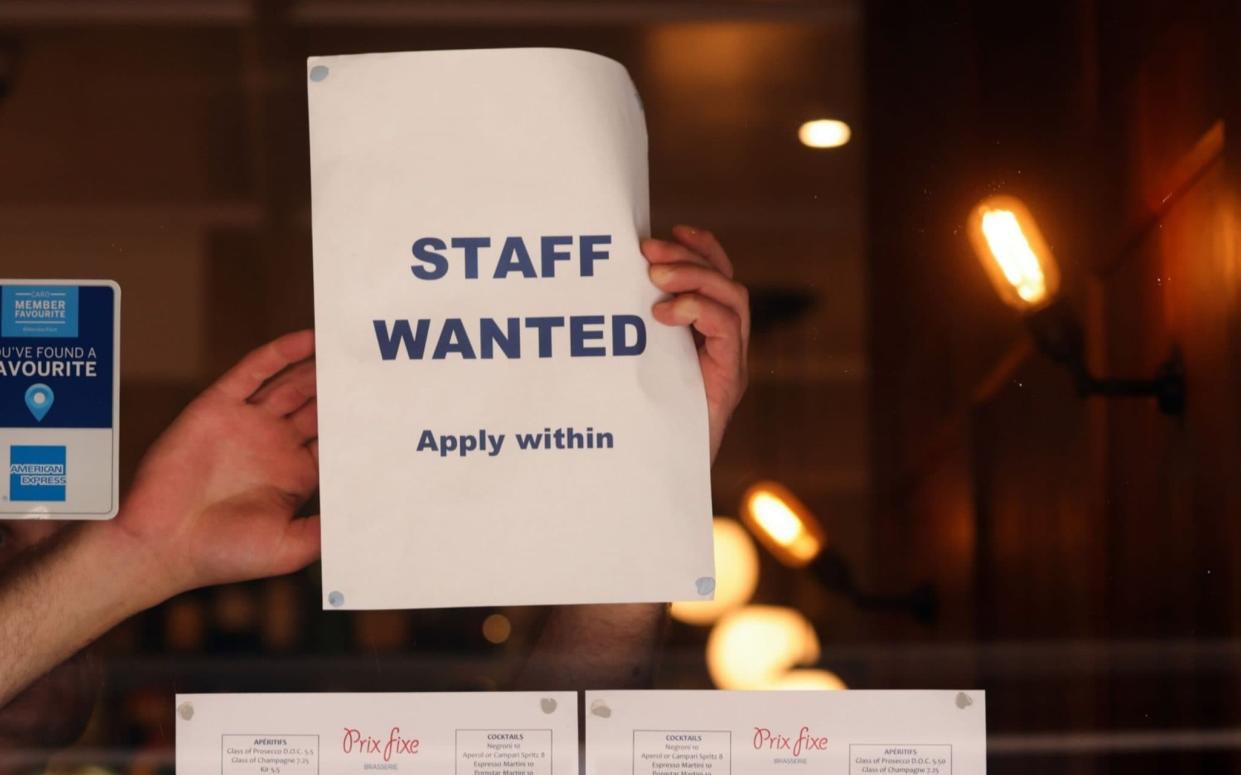After 14 years of Tory rule, no wonder everyone is workshy in broken Britain

- Oops!Something went wrong.Please try again later.
Why has lazybones Britain become the slacker of the G7? Riddle me this, Rishi! Millions of people are missing in action from the jobs market.
The hospitality industry can’t find staff. And most humiliatingly, our work ethic lags woefully behind the rest of the continent – including France, where most of the day is taken up by lunch, Spain, where they don’t sit down to dinner until midnight and Italy, where they eat cake for breakfast.
Whatever happened to Keeping Calm and Carrying on? Stiff upper lips on the Clapham omnibus? The shutters are falling on our nation of shopkeepers as quiet-quitters, long-term-sickers and early retirees walk away.
And that bodes ill for the rest of us who have not just tax coffers to fill but an international reputation to maintain.
At the risk of bringing the Witchfinder Wokerati to my door (again), a quick recap of the natural order of things, courtesy of this classic EU gag.
Heaven in Europe
Is where
the English are the policemen
the French are the cooks
the Germans are the mechanics
the Italians are the lovers
and the Swiss organise everything
Hell in Europe
Is where
the Germans are the policemen
the English are the cooks
the French are the mechanics
the Swiss are the lovers
and the Italians organise everything
See, kids, not all stereotypes are offensive. Oh stop it. Even if they are, that doesn’t detract from the fact they are a jolly useful starting point for geopolitical diplomacy and macro-economic analysis.
In the eyes of the world, we are a dependable if plodding key player, grafters, keen as mustard on rules and their fastidious enforcement. Sure, our trains don’t run on time, our health care system needs urgent defibrillation and potholes vastly outnumber cars on our roads; but our steady-as-she-goes USP is that they know where they are with us.
Except it is becoming increasingly clear they don’t – because those old certainties are crumbling away faster than the Suffolk coastline.
Earlier this week the Office for National Statistics reported that the total number of British people neither working nor seeking work now stands at 9.3 million. That’s more than a fifth of the population aged 18 to 65 – and 670,000 more than in 2019.
Job vacancies are unfilled, productivity is still bumping along in the bottom half of the EU league table, and all in all, it’s a complete fiscal drag. Needless to say, Jeremy Hunt’s new “budget for long-term growth” was brimming with rhetoric on boosting the UK’s workforce – but without any comprehensive strategy, it felt pretty meaningless.
Ben Willmott, the head of public policy for the the Chartered Institute of Personnel and Development, the professional body for HR, responded to this week’s Budget with scepticism: “There is a real and urgent need for a workforce plan for the UK to raise employer investment in skills and support workers’ wellbeing and participation in the labour market.
“The National Insurance cut will be welcomed by many workers, but it’s highly optimistic to suggest that this move alone will get the equivalent of 200,000 more people into full-time work and solve one in five vacancies. The factors affecting UK labour market participation are much more complex.”
He’s bang on the money there – yes, we need higher wages to take the shine off benefits – but it’s not just about filthy lucre. Something more seismic is going on, as attested by the World Values Survey, one of the largest and most widely used academic social surveys, which has been running since 1981. Last year, it examined perceptions of work and the results were damning for UK plc.
The survey of attitudes across 24 countries found that the British were the least likely to say that work mattered. Just 73 per cent of us felt our job was an important part of life, compared with 96 per cent in Italy and 94 per cent in France.
And while 70 per cent of Italian respondents and 81 per cent of Poles believed people who were not in employment were lazy, in Britain just 40 per cent agreed.
Talk about a work-life imbalance. Truthfully, I barely know where to start – if the majority of citizens don’t feel any sort of obligation towards their own country then something has gone very badly wrong in the realm of civic responsibility.
Much is made of the post-Covid legacy of ill health that has hit the workforce, but other comparable nations have recovered. Mental illness is cited as a significant factor, too. But neither explains the fundamental shift in how 60 per cent of us view society and, crucially, our place in it.
I strongly suspect it partly bespeaks an entitled post-pandemic insistence on working from home or not at all, together with generalised weariness and cynicism after 14 years of the Tories in power. The same went for 13 years of Labour from 1997 to 2010. Governments run out of ideas as well as goodwill; a single party state is not the British way, despite the Conservatives’ bizarre insistence that they have a right to rule. What, forever?
For its part, Labour says they will get tough on the workshy. “Under our changed Labour party, if you can work, there will be no option of a life on benefits,” Liz Kendall, the shadow work and pensions secretary, declared in a speech earlier this week.
Good luck with that, is all I can say. I fear broken Britain needs a better incentive to crawl out of bed and get into work every morning. Perhaps we too should start eating cake for breakfast?

